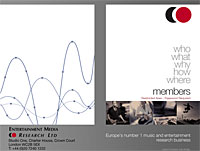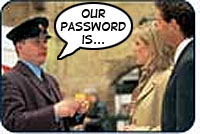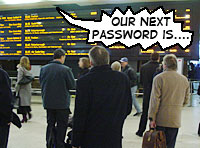 According to a survey by Entertainment Media Research, UK legal digital music downloads have grown by a thumping great 75% in a year.
According to a survey by Entertainment Media Research, UK legal digital music downloads have grown by a thumping great 75% in a year.
The 2005 Digital Music Survey also predicts that UK consumers will spend 60% more on buying music downloads in the next six months
Although 40% of UK music lovers are still grooving to music files illegally downloaded to their MP3 players and PCs, the survey found that 35% had bought legal downloads with a further 23% intending to start purchasing downloads soon.
Legal downloads are continuing to find favour with consumers, with over two thirds of illegal downloaders claiming they will download less in the future.
The survey revealed that the dwindling enthusiasm for dodgy downloading was due to user concerns about prosecution (44%), fear of viruses (29%) and inferior audio quality vs legal downloads (21%).
 These findings are supported by the news that legal digital downloads have accounted for 8% of Coldplay’s recent album sales in the US – the biggest share for any new release to date.
These findings are supported by the news that legal digital downloads have accounted for 8% of Coldplay’s recent album sales in the US – the biggest share for any new release to date.
Dutifully dissecting the digital demographic, we can reveal that the fear of getting into trouble with The Man worried 13-17 year olds (50%) and women (47%) the most, while 35-44 year olds (35%) and women (34%) were most concerned about the prospect of downloading infected and unauthorised files.
Spoddy, EQ-adjusting audio aficionados of the male variety were the most put off by the audio quality of the unauthorised tracks, with the difficulty in finding the exact right track particularly troubling music-obsessed blokes between 25-44.
The survey discovered that legal download demand is being fuelled by immediacy over price, with nearly two-thirds (63%) claiming immediate availability as being the key reason.
The ‘must-have-that-record-now’ ethos was most reflected by men in the 18-24 age group, with the price of downloads relative to CDs seen as a less important factor (43%).
 Two fifths of those surveyed preferred digital downloads because they were only interested in one or two tracks, while 29% downloaded music to sample an album before purchase.
Two fifths of those surveyed preferred digital downloads because they were only interested in one or two tracks, while 29% downloaded music to sample an album before purchase.
The survey revealed that 45% of legal downloaders buy current singles, unlike older consumers (45 years plus) who tended to know what tracks they want and were more likely to purchase 1-2 tracks from an album.
Russell Hart, Chief Executive, Entertainment Media Research, rummaged through the figures, mulled for a moment and then declared, “The findings indicate that the music industry is approaching a strategic milestone with the population of legal downloaders close to exceeding that of pirates.”
The survey was undertaken in association with law firm, Olswang, with their senior partner and Digital Lifestyles chum John Enser, commenting, “Clear deterrents to illegal downloading are emerging with fear of prosecution running high and close behind is the sense that unauthorised downloading is “not fair on the artists,” suggesting that the industry’s messages, led by the BPI, are being communicated effectively.”
 In a novel move to publicise the benefits of broadband for regional dwellers, the Welsh Assembly Government’s Broadband Wales Unit sent mobile Internet gateways scurrying around the valleys and mountains of lovely, lovely Wales.
In a novel move to publicise the benefits of broadband for regional dwellers, the Welsh Assembly Government’s Broadband Wales Unit sent mobile Internet gateways scurrying around the valleys and mountains of lovely, lovely Wales. The Get Smart – Get Broadband campaign revs up at Swansea Party in the Park this Sunday, where fans will be able to send messages (known in the vernacular as “shout outs”) from the Smart Cars to a giant onstage screen.
The Get Smart – Get Broadband campaign revs up at Swansea Party in the Park this Sunday, where fans will be able to send messages (known in the vernacular as “shout outs”) from the Smart Cars to a giant onstage screen. In an interesting reversal of new media trends, online leisure retailer lastminute.com is to launch its first print magazine.
In an interesting reversal of new media trends, online leisure retailer lastminute.com is to launch its first print magazine. Not to be outdone, Brent Hoberman, chief executive of Lastminute.com, brewed up his own beefy brand of buzzword blather: “The launch of this magazine is a fantastic opportunity to engage with our most loyal customers and reinforce our brand values through inspirational and informative editorial.
Not to be outdone, Brent Hoberman, chief executive of Lastminute.com, brewed up his own beefy brand of buzzword blather: “The launch of this magazine is a fantastic opportunity to engage with our most loyal customers and reinforce our brand values through inspirational and informative editorial. BT has unveiled a smarty-pants phone designed to integrate landline and mobile phone technologies.
BT has unveiled a smarty-pants phone designed to integrate landline and mobile phone technologies. BT Fusion is part of the company’s strategy to lure back customers wooed by mobile telephonic temptresses touting cheap calls.
BT Fusion is part of the company’s strategy to lure back customers wooed by mobile telephonic temptresses touting cheap calls. “The future will be convergence”, insisted Livingstone. “This is going to be a market that grows fantastically over time even though it might take a while to get going. We still expect many millions of converged handsets by the end of the decade.”
“The future will be convergence”, insisted Livingstone. “This is going to be a market that grows fantastically over time even though it might take a while to get going. We still expect many millions of converged handsets by the end of the decade.” Calls to landlines originating in the home will be ratcheted up at BT’s regular rate of 5.5 p (10 cents, €0.08) for up to an hour.
Calls to landlines originating in the home will be ratcheted up at BT’s regular rate of 5.5 p (10 cents, €0.08) for up to an hour. 1. Ofcom have produced more original thinking than I gave them credit for, initially, perhaps because the introduction and summary to the document are not as robust as its contents. Read on…
1. Ofcom have produced more original thinking than I gave them credit for, initially, perhaps because the introduction and summary to the document are not as robust as its contents. Read on… This reflects the EU rules governing the use of State Aid, which require that publicly funded services such as the BBC’s must complement rather than substitute or duplicate provision by the market. Furthermore, where market developments supersede publicly funded provision, the BBC should withdraw from those services or activities and re-direct its valuable public resources to areas of activity where there is a proven market failure. While market failure should not be the only test applied to BBC services, it should provide the underpinning for all publicly funded BBC services. The absence of a market failure analysis raises significant questions as to the compatibility of the BBC’s publicly funded status with European State Aid rules.
This reflects the EU rules governing the use of State Aid, which require that publicly funded services such as the BBC’s must complement rather than substitute or duplicate provision by the market. Furthermore, where market developments supersede publicly funded provision, the BBC should withdraw from those services or activities and re-direct its valuable public resources to areas of activity where there is a proven market failure. While market failure should not be the only test applied to BBC services, it should provide the underpinning for all publicly funded BBC services. The absence of a market failure analysis raises significant questions as to the compatibility of the BBC’s publicly funded status with European State Aid rules. Ofcom has today reported its quarterly figures on the rate of take-up of digital TV in the UK.
Ofcom has today reported its quarterly figures on the rate of take-up of digital TV in the UK. This is bad news for Sky, as it’s starting to get close to the around 7.5m homes that they have. What’s worse news for them is in the detail of the report. Sky’s all-important ARPU (Average Revenue Per User) has dropped from £386 in Q4 2004 to £382 in Q1 2005. This might not sound huge, but for an organisation that is trying to constantly increase their ARPU, it’s not encouraging. Another figure of note is their rate of churn, that’s up to 11.1% form 9.6% in the previous quarter.
This is bad news for Sky, as it’s starting to get close to the around 7.5m homes that they have. What’s worse news for them is in the detail of the report. Sky’s all-important ARPU (Average Revenue Per User) has dropped from £386 in Q4 2004 to £382 in Q1 2005. This might not sound huge, but for an organisation that is trying to constantly increase their ARPU, it’s not encouraging. Another figure of note is their rate of churn, that’s up to 11.1% form 9.6% in the previous quarter. The growth of aerial-delivered Freeview has been gaining more momentum of late, still spearheaded by the BBC using the Freeview channels to first-show a lot of its content.
The growth of aerial-delivered Freeview has been gaining more momentum of late, still spearheaded by the BBC using the Freeview channels to first-show a lot of its content. The breakdown of the figures is as follows
The breakdown of the figures is as follows Animated UK act, Gorillaz, are proudly claiming a world first for their ‘next generation’ enhanced video for ‘Feel Good Inc.’
Animated UK act, Gorillaz, are proudly claiming a world first for their ‘next generation’ enhanced video for ‘Feel Good Inc.’ Bundling in a host of interactive freebies is clearly being seen as a useful marketing tool for record companies, keen to discover new ways to part loyal fans with their cash.
Bundling in a host of interactive freebies is clearly being seen as a useful marketing tool for record companies, keen to discover new ways to part loyal fans with their cash. The band – brainchild of Blur’s Damon Albarn (aka 2D) and Tank Girl” creator Jamie Hewlett (aka Murdoc) – are already celebrating the US success of their second album, “Demon Days,” which has debuted at No. 6 on The Billboard 200.
The band – brainchild of Blur’s Damon Albarn (aka 2D) and Tank Girl” creator Jamie Hewlett (aka Murdoc) – are already celebrating the US success of their second album, “Demon Days,” which has debuted at No. 6 on The Billboard 200. Hot on the heels of yesterday’s story about the ‘world’s greatest military hacker’ comes this tale of advanced doltery from train operator Great North Eastern Railway (GNER), who managed to publish their system passwords in a magazine available to thousands of passengers.
Hot on the heels of yesterday’s story about the ‘world’s greatest military hacker’ comes this tale of advanced doltery from train operator Great North Eastern Railway (GNER), who managed to publish their system passwords in a magazine available to thousands of passengers. GNER, owned by the Sea Containers Group, provide high-speed intercity train services along Britain’s East Coast main line, linking England and Scotland along a route of almost 1,000 miles.
GNER, owned by the Sea Containers Group, provide high-speed intercity train services along Britain’s East Coast main line, linking England and Scotland along a route of almost 1,000 miles. An unemployed Scottish man alleged to have carried out “the biggest military computer hack of all time” will appear in a London court today.
An unemployed Scottish man alleged to have carried out “the biggest military computer hack of all time” will appear in a London court today. NTL’s claim that 300K broadband offer was “more than 5 times faster than standard 56K dial-up internet” has been happy-slapped down by the Advertising Standards Authority (ASA), who condemned it as being in breach of TV Advertising Standards Code.
NTL’s claim that 300K broadband offer was “more than 5 times faster than standard 56K dial-up internet” has been happy-slapped down by the Advertising Standards Authority (ASA), who condemned it as being in breach of TV Advertising Standards Code. The telecoms giant insisted that it was standard industry practice to refer to the speed of broadband only in terms of download speed and, to back up their case, readily snitched on a host of competitors making similar claims.
The telecoms giant insisted that it was standard industry practice to refer to the speed of broadband only in terms of download speed and, to back up their case, readily snitched on a host of competitors making similar claims.